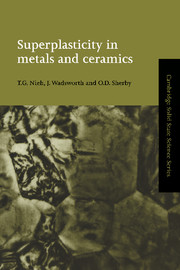Book contents
- Frontmatter
- Contents
- Preface
- Chapter 1 Introduction
- Chapter 2 Key historical contributions
- Chapter 3 Types of superplasticity
- Chapter 4 Mechanisms of high-temperature deformation and phenomenological relations for fine-structure superplasticity
- Chapter 5 Fine-structure superplastic metals
- Chapter 6 Fine-structure superplastic ceramics
- Chapter 7 Fine-structure superplastic intermetallics
- Chapter 8 Fine-structure superplastic composites and laminates
- Chapter 9 High-strain-rate superplasticity
- Chapter 10 Ductility and fracture in superplastic materials
- Chapter 11 Internal-stress superplasticity (ISS)
- Chapter 12 Other possible superplasticity mechanisms
- Chapter 13 Enhanced powder consolidation through superplastic flow
- Chapter 14 Superplastic forming and diffusion bonding
- Chapter 15 Commercial examples of superplastic products
- Index
Chapter 8 - Fine-structure superplastic composites and laminates
Published online by Cambridge University Press: 15 October 2009
- Frontmatter
- Contents
- Preface
- Chapter 1 Introduction
- Chapter 2 Key historical contributions
- Chapter 3 Types of superplasticity
- Chapter 4 Mechanisms of high-temperature deformation and phenomenological relations for fine-structure superplasticity
- Chapter 5 Fine-structure superplastic metals
- Chapter 6 Fine-structure superplastic ceramics
- Chapter 7 Fine-structure superplastic intermetallics
- Chapter 8 Fine-structure superplastic composites and laminates
- Chapter 9 High-strain-rate superplasticity
- Chapter 10 Ductility and fracture in superplastic materials
- Chapter 11 Internal-stress superplasticity (ISS)
- Chapter 12 Other possible superplasticity mechanisms
- Chapter 13 Enhanced powder consolidation through superplastic flow
- Chapter 14 Superplastic forming and diffusion bonding
- Chapter 15 Commercial examples of superplastic products
- Index
Summary
Many metal-matrix composites (MMCs) and laminates have been developed in recent years for advanced structures. Both materials are attractive for many structural applications because they exhibit unusual combinations of structural, physical, and thermal properties including high modulus and strength, good wear resistance, good dimensional stability and low thermal expansion, and low density. Many studies have shown that discontinuously reinforced MMCs can behave superplastically. These composites are mainly aluminum-based, but some magnesium-based and zinc-based composites have also been studied.
Aluminum-based metal-matrix composites
Comparative superplasticity data from some of the representative Al-based composites are summarized in Table 8.1. All of these composites are reinforced by SiC, either in whisker or particulate form. Up to the present time, superplasticity has not only been observed in MMCs produced by powder metallurgy (PM) methods but also in MMCs produced by ingot metallurgy (IM) methods. The composites listed in Table 8.1 were made by conventional PM techniques, except for the 15 vol % SiCw–7475Al, which was manufactured using SiCw layered between specially prepared foils of superplastic 7475A1 alloy. The IM composite, 10 vol % SiCp–2024Al, was produced by stir-casting. For discussion purposes, the composites listed in Table 8.1 are hereafter abbreviated as reinforcement–matrix alloy, e.g., 20 vol % SiCw–2124Al becomes SiCw/2124. As shown in Table 8.1, the reported strain rate sensitivities (m) vary significantly.
- Type
- Chapter
- Information
- Superplasticity in Metals and Ceramics , pp. 145 - 153Publisher: Cambridge University PressPrint publication year: 1997

